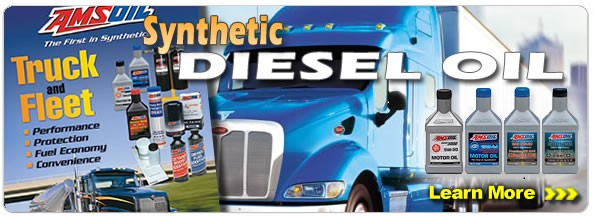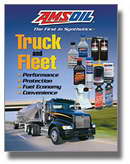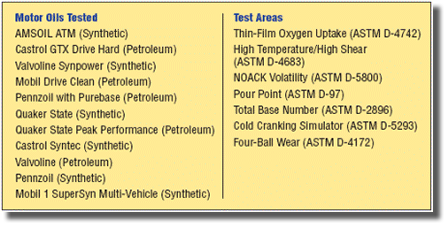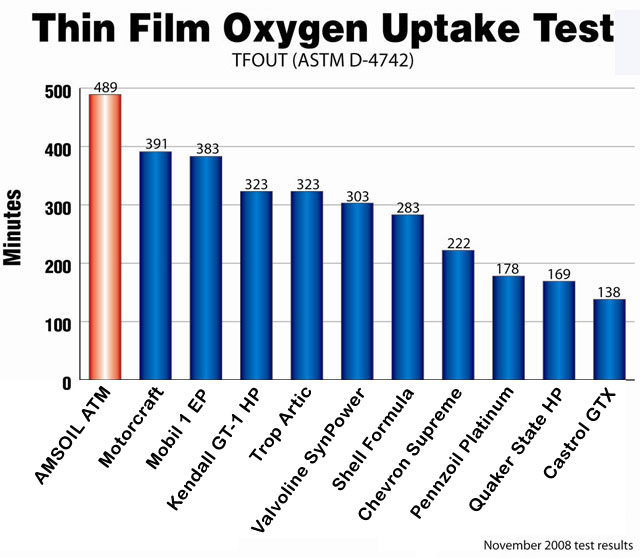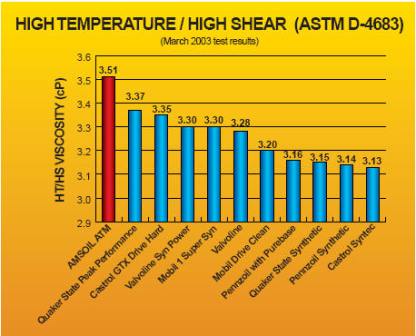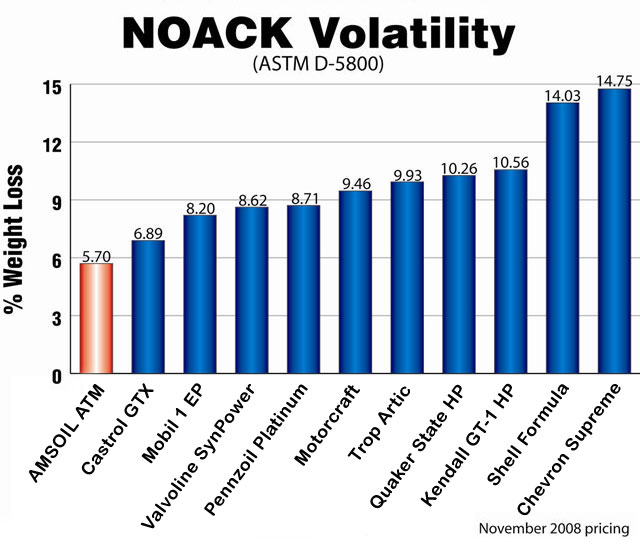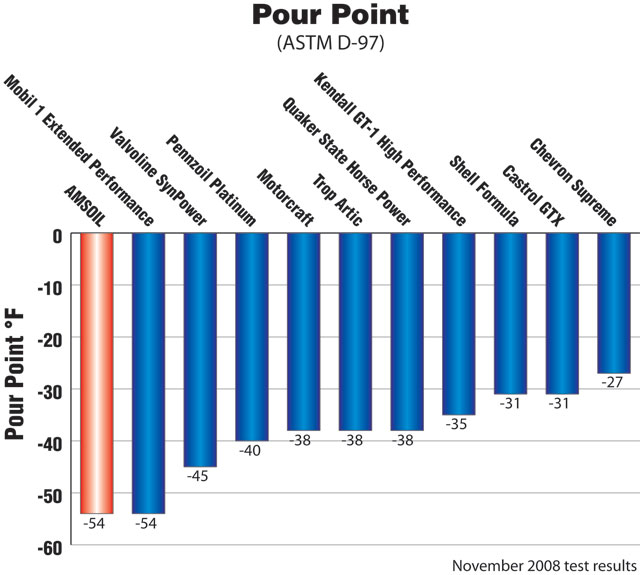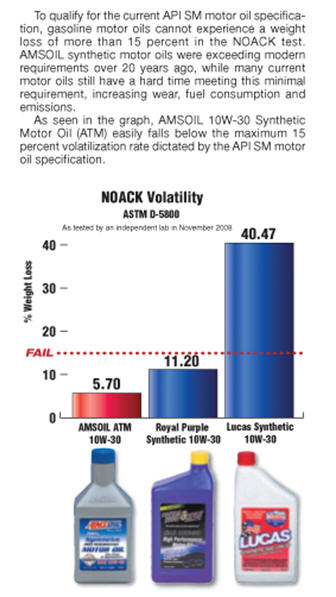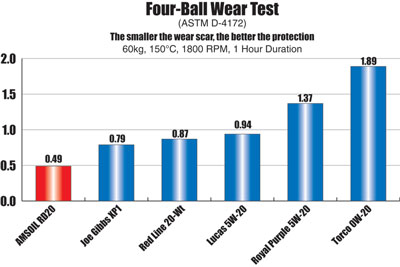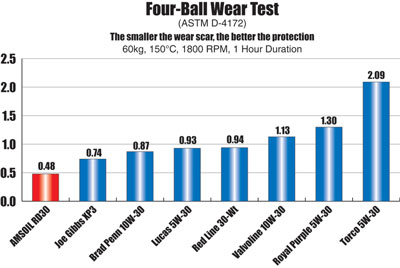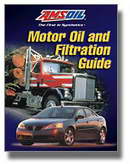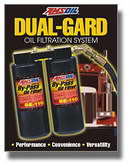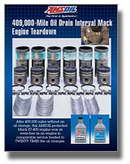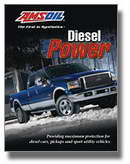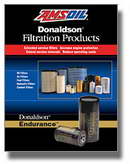|
Amsoil vs Mobil 1 Royal Purple Castrol ValvolineAPI Motor Oil Testing: AMSOIL Synthetic 10W-30 Motor Oil (ATM) and 10 competing conventional and synthetic 10W-30 motor oils were subjected to a series of API motor oil tests. The competing oils included petroleum-based Castrol GTX Drive Hard, Mobil Drive Clean, Pennzoil with Purebase, Quaker State Peak Performance and Valvoline, as well as synthetic-based Valvoline Synpower, Quaker State, Castrol Syntec, Pennzoil and Mobil 1 SuperSyn Multi-Vehicle.
Seven API tests were run on the motor oils. The Thin-Film Oxygen
Uptake Test (TFOUT) measures the oxidation stability of engine oils. The High Temperature/High Shear Test (HTHS)
measures a lubricant’s viscosity under severe operating conditions. The NOACK Volatility Test measures the
evaporation loss of oils in high temperature service. Pour Point indicates the lowest temperature at which a fluid
will flow. Total Base Number (TBN) is the measurement of a lubricant’s reserve alkalinity for combating acids. The
Cold Cranking Simulator Test (CCS) measures a lubricant’s viscosity at low temperatures and high shear rates. The
Four-Ball Wear Test measures a lubricant’s wear protection properties. The impressive test results show AMSOIL
Synthetic 10W-30 Motor Oil outperformed the competitors in each test.
High Temperature/High Shear (ASTM
D-4683):
NOACK Volatility (ASTM
D-5800):
Pour Point (ASTM D-97):
Total Base Number (ASTM
D-2896):
Cold Crank Simulator (ASTM
D-5293):
Four Ball Wear (ASTM
D-4172):
AMSOIL INC. has been the leader in synthetic motor oil formulation since its introduction of the world’s first API rated synthetic motor oil in 1972. By specializing exclusively in synthetic lubricant technology, AMSOIL is able to optimize the most advanced chemistries available. The “Genuine Synthetic PAO Formulated” designation displayed on AMSOIL packaging indicates that the oils are formulated with Polyalphaolefin (PAO) synthetic base stocks. This chemistry is the industry’s premier base stock technology. Unlike conventional mineral-based chemistries, AMSOIL PAO base stocks contain fully saturated, hydrogenated molecules and are free of wax and other impurities. Combined with an exact balance of premium additives, it delivers superior hot and cold temperature performance, resists oxidation and acid formation and provides long-term wear protection. AMSOIL “Genuine Synthetic PAO Formulated” oils have shattered the parameters of the most rigorous industry testing and set the standard for all other motor oils.
Royal Purple Info
As you may know, Royal Purple is well known in racing circles. The chemistry they use is something AMSOIL, Inc. chooses not to use in their oil formulation. One of Amsoil's big selling points is extended drain intervals, such as our 25,000 mile and 35,000 mile oil change intervals. Some additive chemicals such as Moly may cause adverse conditions when used for long periods. Royal Purple uses a different chemistry than most oil producers. They are one of only a handful of marketers using Molybdenum Disulfide (Moly) in their oil formulations at these higher levels. Moly is a processed mineral that is similar in appearance to graphite. Moly has good lubricating properties when used either by itself (in dry power form or as an additive to oil or other lubricants). Particles of the Moly can come out of suspension and agglomerate. Over time this may actually clog or partially clog oil filters or oil lines and the remainder normally settles in the bottom of the oil pan. This seems to be more likely when using extended drain intervals. The only test we ran on Royal Purple involved their 20W50 Racing oil versus our AMSOIL Series 2000 Synthetic 20W50 Racing Oil (TRO). We ran two 4 ball wear tests with different parameters, a spectrographic baseline, FTIR scan and volatility tests. The Royal Purple showed a significantly high volatility rate with a 12.51% boil off rate. This compares to the AMSOIL TRO with only a 4.47% volatility rating. Wear scars were also smaller with the TRO. For example the AMSOIL TRO left a .41mm scar and the Royal Purple oil left a .66mm scar. The lower the scar damage number the better! There was also a surprising difference in the viscosity index. The RP has a VI of 129 versus 155 for the TRO. The higher the VI, the better the viscosity stays in place at high temperatures.
Note: This information was provided by AMSOIL, Inc. Tech Department. An independent lab tested the Royal Purple 20W-50 racing oil against the AMSOIL 20W-50 racing oil. The results are posted above. Test results found Moly in the Royal Purple oil sample.
6 Month Amsoil Preferred Customer Trial Membership Form Register for trial Now and Save 25%-30% off Retail Prices
|
IF YOU WOULD LIKE TO GO DIRECTLY TO ONE OF THE PRODUCT PAGES BELOW TO ORDER OR GET MORE INFORMATION PLEASE DO SO BY SELECTING A CATEGORY.
NOTE: TO UTILIZE THE FREE SHIPPING, PICK A CATEGORY AND FOLLOW THESE STEPS. WHEN THE NEW WEB WINDOW APPEARS, CLICK ON THE TAB THAT SAYS "CONTINUE SHOPPING". YOU WILL BE TAKEN TO THE ONLINE STORE TO MAKE YOUR PURCHASE OR GET MORE DETAILS ON THE PRODUCT'S.
NOTE: TO GET DEALER PRICES, CHOOSE THE "BUY WHOLESALE" OPTION IN THE NEXT WINDOW AFTER YOU PICK A CATEGORY BELOW. TO ADD THE PREFERRED CUSTOMER DISCOUNT TO YOUR SHOPPING CART, CLICK ON THE "SAVE 25%" LOGO ON THE PAGE THAT COMES UP. YOU WILL RECEIVE THE WHOLESALE DISCOUNT ONCE YOU ADD THE P.C. DISCOUNT TO YOUR CART, WHOLESALE PRICING WILL BE DISPLAYED FOR YOUR ORDER. 6 MONTH TRIAL, OR 1 YEAR MEMBERSHIPS ARE AVAILABLE.
REQUEST THE PRICING AND PREFERRED CUSTOMER DISCOUNT EMAIL BY SELECTING ENTERING YOUR NAME AND EMAIL. CLICK HERE |
Joe Lee - Authorized Amsoil Dealer PH (763) 213-9163
7384 Lake Dr Lino Lakes, MN 55014
XSite pro video - Build your very own website like the one you are on now!
